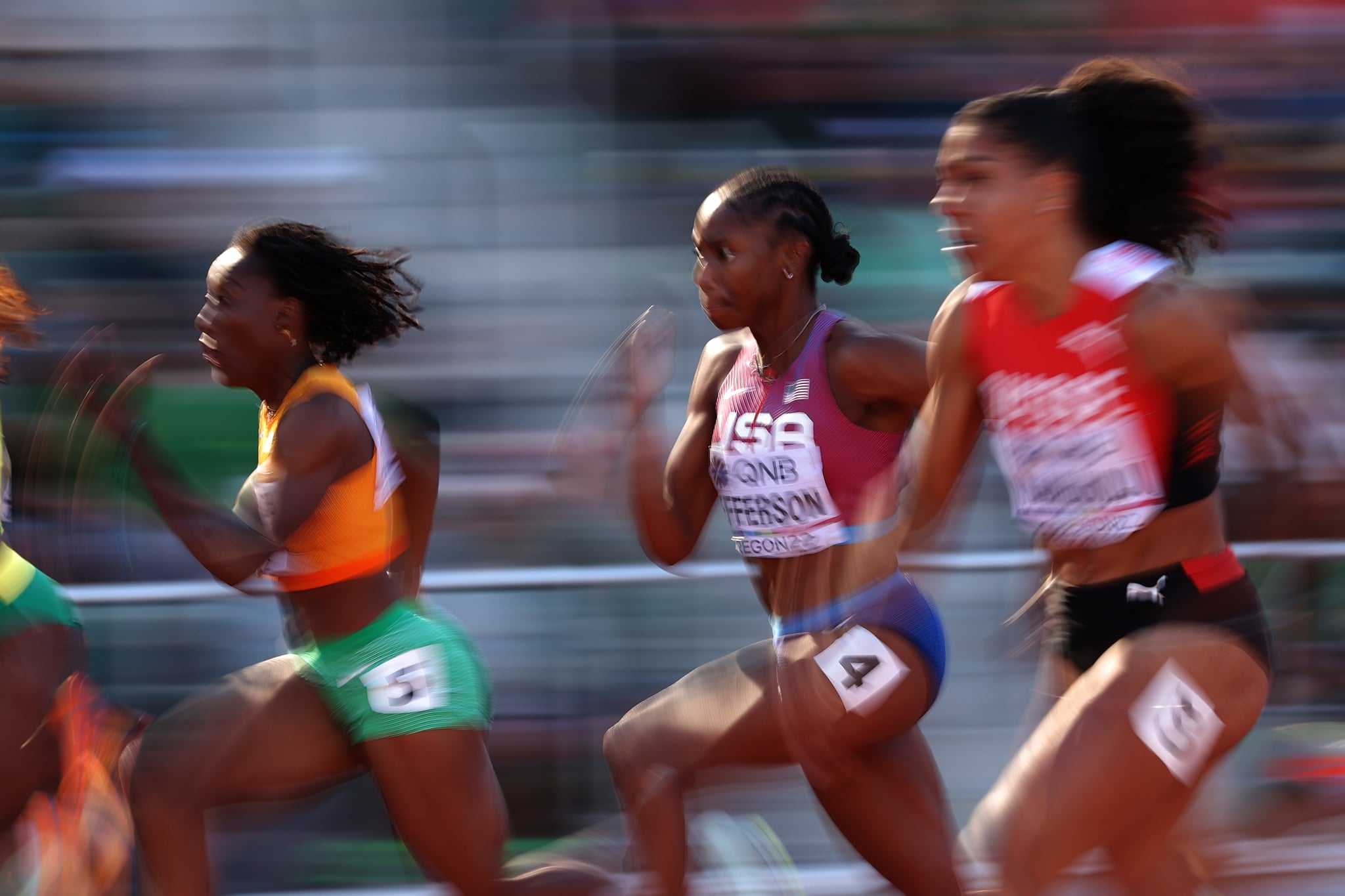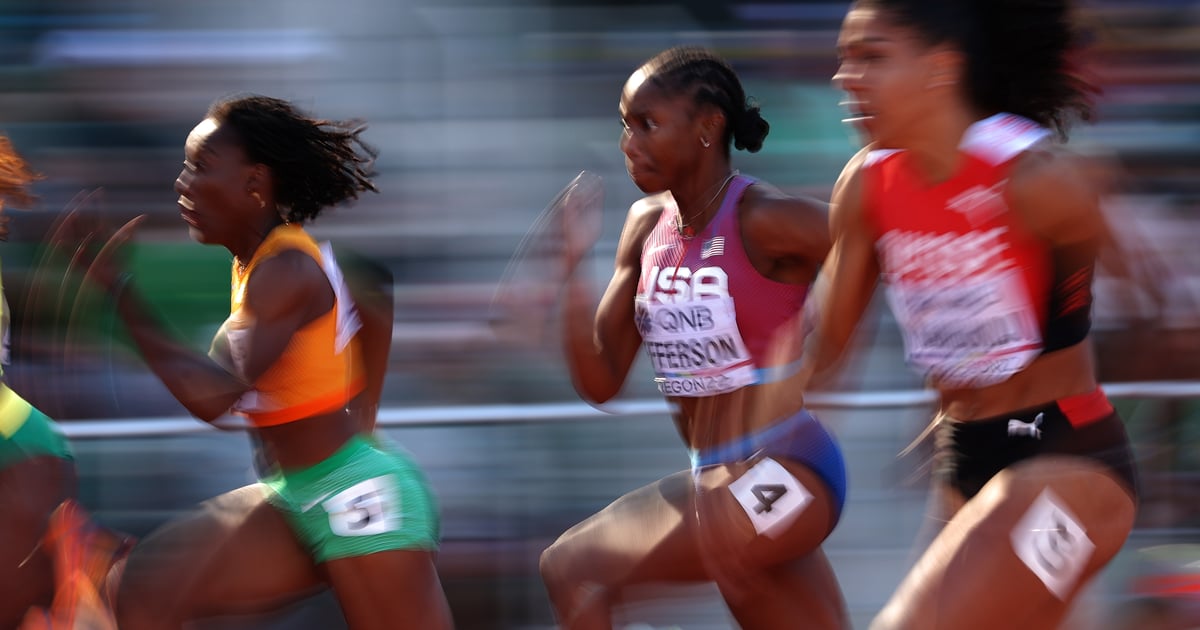
In a perfect world, all people could participate in the sport of their choice — regardless of skill set, physical abilities, skin color, gender, age, or background. And although there’s a growing desire to increase inclusion in the sports world (think: facilities determined to be a safe space for LGBTQ+ athletes and advocates for diverse representation), a recent announcement by World Athletics, the international organization for track and field, seeks to set the transgender community back.
The cruel irony is that this ruling takes effect on March 31, International Transgender Day of Visibility.
Lord Sebastian Coe, president of the group, announced last week that transgender women would no longer be allowed to compete in the “female category” at international events — claiming the decision was “guided by the science around physical performance,” per a press release from the organization. The ruling applies to all athletes who have transitioned after puberty, based on the belief that their testosterone levels had developed enough to give them the upper hand in competitive sports. “We’re not saying no forever,” Coe continued, explaining that a group will review the decision and underlying research on the claim over a 12-month period before re-evaluating.
The cruel irony is that this ruling takes effect on March 31, International Transgender Day of Visibility.
Prior to this decision, World Athletics required transgender women to reduce their testosterone levels to a maximum of 5 nmol/L and stay under this level for 12 months before competing in the women’s category to eliminate unfair advantage. Coe emphasizes the recent decision was “guided by the overarching principle which is to protect the female category.” In its release, World Athletics does make it clear that “there are currently no transgender athletes competing internationally in athletics.” Even though there’s no present threat to the women’s category of competition in their events, the World Athletics council still decided to “prioritise fairness and the integrity of the female competition before inclusion.”
Like most human rights issues, the public has been split on the decision. Cisgender athletes like British Olympic runner Emily Diamond welcomed the news, writing in a Tweet it was “a big step for fairness and protecting the female category.” UK-based campaign group Fair Play For Women echoed her sentiments, tweeting: “World Athletics finds the courage to protect female sport once more.”
Others have taken an opposite call to action on the matter, recounting the 2021 International Olympic Committee Framework for Fairness: “No athlete should be precluded from competing or excluded from competition on the exclusive ground of an unverified, alleged or perceived unfair competitive advantage due to their sex variations, physical appearance and/or transgender status.”
“What we need now more than ever is for people to take the time to learn about transgender athletes and see them as human beings who simply want to take part in something they love.”
Liz Ward, director of programs at Stonewall, a UK-based LGBTQ+ group, shared her disapproval on the matter. “It is so disappointing to see World Athletics announce a unilateral ban on trans women in track and field events. Their own statement recognizes that there are no trans women competing at an international level and that they have no specific evidence to justify the ban,” she tells POPSUGAR. “It is vital that decisions about trans participation are based on robust evidence, specific to the sport played, and the athletes competing at that level of the sport. We stand with trans people who now have the door closed on their chance to compete in athletic sports at an international level.”
Joanna Hoffman, director of communications for Athlete Ally, urges supporters and sports advocates all over to “join in fighting against threats and to stop targeting transgender athletes. Every person deserves to be exactly who they are, and to be safe, welcome, and included in all parts of their life, including sports.”
World Athletics isn’t the only group to make a ruling like this. Last year, FINA, the world governing body for swimming, prohibited transgender women from participating in female swimming competitions. The International Rugby League also barred all trans women from competing until it creates an official “transwomen inclusion policy” sometime this year. Meanwhile, in the US, 19 states have so far banned transgender athletes from playing on girls’ or women’s sports teams, reports NPR. And the anti-trans sanctions aren’t exclusive to the sports world; lawmakers are also introducing unprecedented anti-trans legislation in several states.
As far as trans athletes are concerned, the central debate is over the balance of inclusion versus limited science on whether or not transgender women can compete in female categories without an unfair advantage. The problem with that is not everyone fits into outdated gender boxes, and the consequence of excluding transgender women is to punish an already marginalized group. Instead of focusing on gender, the spotlight should be placed on actual threats to women’s sports like unequal pay, lack of women leadership and resources, sexual harassment and abuse, and misrepresentation.
What this ruling proves is fairness has an asterisk — claiming to be non-negotiable, but not for all, for some. “Decisions are always difficult when they involve conflicting needs and rights between different groups, but we continue to take the view that we must maintain fairness for female athletes above all other considerations,” Coe declared. Stating the decision was done to protect women when it doesn’t include all women is not inclusion; it’s discrimination. Time and time again, when it comes to the transgender, POC, disabled, and many other marginalized communities, equality is compromised.
At the end of the day, transgender women, like cisgender women, just want to exercise the right to compete at the level of their skill set. “What we need now more than ever,” Hudson Taylor, founder and executive director of Athlete Ally, tells POPSUGAR,”is for people to take the time to learn about transgender athletes and see them as human beings who simply want to take part in something they love.”
Image Source: Getty Images / Ezra Shaw
